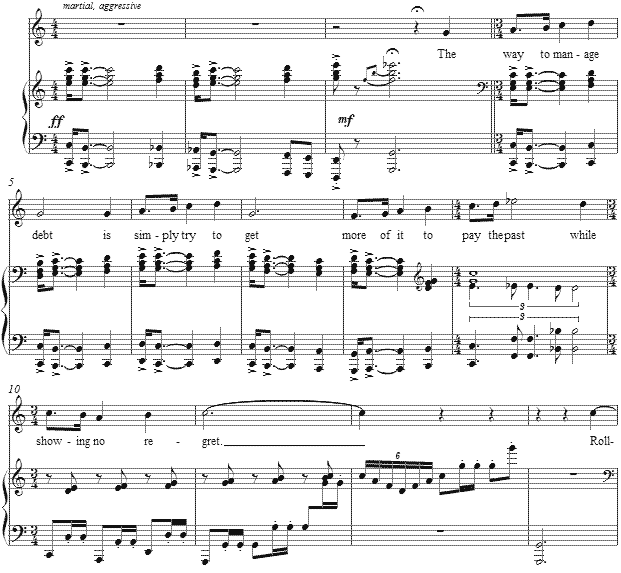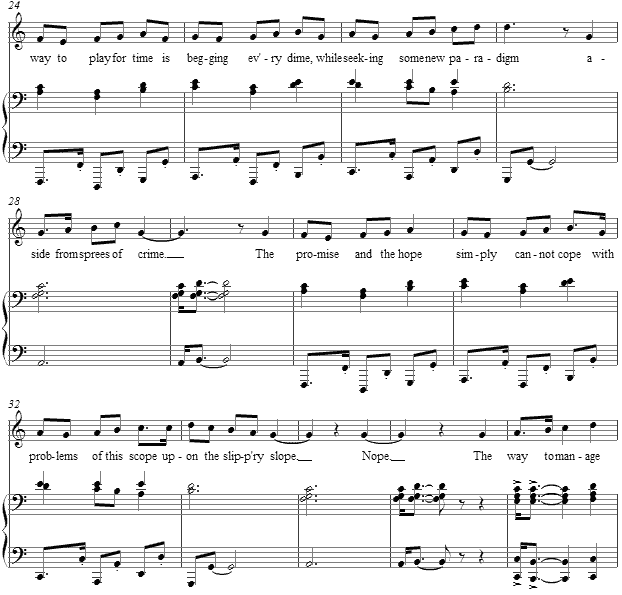Music and Texts of GARY BACHLUND
Vocal Music | Piano | Organ | Chamber Music | Orchestral | Articles and Commentary | Poems and Stories | Miscellany | FAQs
A Government Song - (2009)
text by the composer
for medium voice and piano
The way to manage debt
Is to simply try to get
More of it to pay the bet
While showing no regret.
Rolling over hefty sums
While twiddling federal thumbs;
Spending on one's party's chums
Is how the future comes.
The way to play for time
Is begging every dime,
While seeking some new paradigm
Aside from sprees of crime.
The promise and the hope
Simply cannot cope
With problems of this scope
Upon the slippery slope.
Nope.
The way to manage debt
Is to pay it back, and yet
Government seems quite upset
To shrink their silhouette.
Government! O, government! O why?
The way to manage debt
Is to pay it back![ 3 pages, circa 1' 50" ]
US Secretary of State with Chinese President / 2009
The United States Secretary of State met with the Chinese President this week to discuss China's continuing lending to the US. AFP reported in an editorial-tinged news item on the 23rd of February that, "China has little choice but to follow Hillary Clinton's call and continue buying US Treasuries, as reversing course would lead to the value of its investments plunging, economists said Monday." Little choice was the message, and it is a message which seems more like strong-arm tactics than a business dealing. The article continued, " 'Brad Setser, an economist with the New York-based Council on Foreign Relations, calculated that China provided close to 500 billion dollars in financing to the United States last year -- too much, he argued. China now has more exposure to the US than is in its long-run interest,' Setser wrote on Monday. Economists argue China risks being trapped as the value of its US assets would fall if it reversed course." Debt is, of course, a trap, and politicians and political parties worldwide have stepped in it decades ago.
Another era gave us Benjamin Franklin's wise and oft-ignored adage, "Neither a borrower nor a lender be," but the sentiment has much older roots.
One finds in William Shakespeare's Hamlet, Act 1, Scene 3, "Neither a borrower nor lender be for loan oft loses both itself and friend and borrowing dulls the edge of husbandry. This above all, to thine own self be true. And it must follow, as the night the day thou canst not then be false to any man," William Shakespeare, Hamlet, Act 1, Scene 3.
It seems that modern politics [ 1 ] and modern economic wisdom -- which "dulls the edge of husbandry" -- differs from the consistent advice from Shakespeare through Franklin, as today's worldwide financial crisis is rooted first and foremost in massive government debt, with political parties of all kinds having participated in its unwise and now crushing growth. Ergo this text, penned over the morning coffee. The obvious solution [ 2 ] is simply too painful for government -- but not for us -- to consider.
The accompaniment warps the quarter-note rhythm in 3/4 time of "My Country 'Tis Of Thee" (also known as it hymn name, America and in Britain, God Save the King) into a sharp, cheeky Scotch-snap rhythm to underpin a melody unlike the well-beloved hymn tune. As one might "stretch the truth," the meter is stretched at the line "pay the past" -- for indeed, public debt pays for programs already used up and does not one good for today nor for tomorrow. After this stretching, a simple and blithe accompaniment figure reminiscent of Heart and Soul finishes the verse flippantly.
The bridge material is drawn from that same figure mentioned above moving in diatonic displacements to cadence on the dominant. The last verse extends the final cadence with the charge to "pay it back." This is, of course, the only ultimate solution to all the worldwide issues of public debt. There are only two alternatives, those being abrogation of massive and unsustainable debt or repayment. The composer hopes that governments will become enlightened enough to conclude that public debt is an oxymoron and fool's game, as such mainstream thinkers as William Shakespeare through to Benjamin Franklin so consistently and wisely observed.
The score for A Government Song is available as a free PDF download, though any major commercial performance or recording of the work is prohibited without prior arrangement with the composer. Click on the graphic below for this piano-vocal score.
NOTES
[ 1 ] A number of seminal and exemplary Americans have had their say about tax-gouging, debt raising government, but among them one quote leaps out to me as most instructive of human nature, which underlies and always betrays the emptiness of "modern" political theory.
Specifically, Mark Twain observes without mincing words, "Communism is idiocy. They want to divide up the property. Suppose they did it -- it requires brains to keep money as well as make it. In a precious little while the money would be back in the former owner's hands and the communist would be poor again." (in A Biography)
Oddly prescient for today's various goings on in the world, wherein the insolvency and bankrupting of nations is falsely charged to the "free market" failing, when in fact it is regularly and demonstrably the skewing of free markets by government interventions, controls and, in Twain's parlance, "idiocy."
This is why the meeting between the officially Communist Chinese government and a supposed free world government leader was so sadly humorous. The officially Communist politics in China is, in fact, fascist. It is a one-party politics in which the party controls business. In doing so, it does not pass on the "profits" to its people, but rather has built huge strategic cash reserves, much of it in dollars.
Meanwhile the erstwhile official Western democrat represents a national strategy in which instruments of debt are sold to China in order to gain cash which the US does not have in order to distribute it to its people. Which, based on this perspective, is more the idiot by Twain's assertion? For those who will suggest this question is indicative of my party preference, they would be wrong. I favor neither Democrat nor Republican parties, for they both have pursued massive borrowing "against tomorrow" which is imprudent, at best, and a tragedy for the coming generations. A pox on both houses, therefore.
[ 2 ] The traditional Jewish perspective on debt is not the modern socialist view, as can be seen in Parshat Ki Tavo. Referring in part to Deuteronomy 28:44, "He will lend to you, but you will not lend to him: he will be the head, and thou will be the tail," the Torah portion suggest clearly that a part of being rewarded in life -- mentioning healthy children, a breadbasket overflowing, and enemies fleeing -- comes from obedience to God's law.
The opposite -- the curse -- mentions children becoming enslaved and enemies overrunning a nation. This is the meaning of "he will be the head, and you will be the tail." Debt makes the borrower a slave to repayment; the greater the debt, the greater the enslavement. With this argument in mind, long term public debt without paying it off is in fact a curse, a breaking with the covenant as seen through the eyes of traditional Judaism.
The traditional Christian view centers on a quote from Romans 13:8, which reads "Let no debt remain outstanding, except the continuing debt to love one another, for he who loves his fellowman has fulfilled the law." Moreover, Christian theology reaches back to the Psalm 37:21 to underscore the perspective from Romans, noting "the wicked borrow and do not repay, but the righteous give generously."
Sadly, decades of increasing national debt by many nations and rolling over this debt into new loan treasury bonds is tantamount to never paying off the debt; one might well argue therefore that the addiction to public debt is specifically non-Christian.
The traditional Muslim perspective on debt is found in part in the longest ayah in the Quran, 2:282. One feature to the language as regards debt is its relationship to submission the debt holder and to humiliation of the one seeking to be in debt. The most cited quote is: "When a man gets into debt, he speaks and tells lies, and he makes a promise and breaks it." (al-Bukhaari 832). One may conclude then that public debt is not supported by Islam.
The traditional Hindu view relates debt to the notion of karma, in which debts are brought about by wrong action. Freedom from debt is therefore among the joys of life, as well as worthy children, good friends and more. The notion of purushartha, Sanskrit for human purpose in the sense of wealth, clearly links righteous living (dharma) with material abundance (artha, which includes in its nexus of ideas the absence of debt to another), as well as pleasures (kama) and liberation (moksha). As a concept of individual wealth, the absence of debt is the reason for tithing and charity. One is not meant to go into debt in order to be charitable, which is illogical and unwarranted in the Hindu tradition.
Within the strains of Buddhism, debt (ina) is discussed at length in Anguttarnikaya. In its stories and illustrations, the Buddha says that while poverty is no blessing in of itself, worse than poverty is taking loans and not paying them back. This is characterized as improper and reckless thinking. Further the Buddha comments that one having taken on such debt exhibits shame in going to others for financial help, and should adopt a fear of further debt while making all diligence to repay the original debt incurred. A history of public debt around the world shows it to be in direct contradistinction to the teachings of the Buddha. Moreover, it is from charity from those who either have discharged their debt or not accepted debt to begin with that true charity comes. Thus financing the social welfare contracts of many nations by further borrowing though these nations are already in debt shows them to be shameful and unwise and unworthy of happiness. Quite a censure for those governments and their leadership who seek ever greater public debt.
The point of this cursory sketch of the world's great religions' views on debt shows that nowhere is there to be found a philosophical or religious justification for what has occurred throughout the late twentieth century and into our time. None at all.
Public debt on the scale seen today is nonsensical, and a violation of every moral code which the modern world has had given it from centuries of human experience save one -- the practice of the Ponzi scheme, in which increasing debt is sought to pay off previous investors while spending the profits lavishly without thought to tomorrow. It is essentially criminal except for the small detail that when governments write their own laws, they may make "legal" that which is nonsensical, and violates the freedom and prosperity of man. Such a practice is the sure road to totalitarianism of some form or the economic collapse of the government(s) in question.


